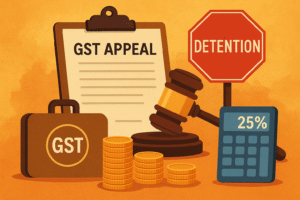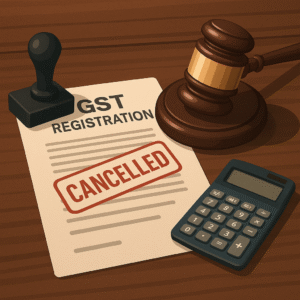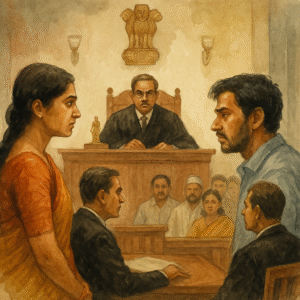The Patna High Court, in an oral judgment dated 29 July 2024, dismissed a writ petition challenging the cancellation of a Goods and Services Tax (GST) registration. The petitioner—an assessee under the Bihar Goods and Services Tax Act, 2017 (BGST)—had approached the Court after its statutory appeal against the cancellation order was rejected as time-barred. The Division Bench (Hon’ble the Chief Justice and Hon’ble Mr. Justice Partha Sarthy) declined to exercise writ jurisdiction under Article 226 of the Constitution, holding that the petitioner had an effective alternate remedy which was not pursued within the prescribed limitation, and even a one-time amnesty route for restoration had been ignored.
Simplified Explanation of the Judgment
This case concerns the cancellation of a GST registration of a business in Patna. The tax department cancelled the registration by an order dated 14 May 2023. Instead of immediately filing an appeal, the aggrieved registrant waited well past the time allowed by law. When an appeal was eventually filed, it was rejected for being late. The petitioner then moved the High Court under Article 226, asking for the writ court to intervene and set things right. The High Court refused.
Under Section 107 of the BGST Act, an assessee who is unhappy with a decision such as cancellation of registration can file an appeal within three months. The statute also gives one extra month for applying for condonation (forgiving) of delay, provided there are satisfactory reasons. In this case, the cancellation order was issued on 14 May 2023. Counting three months from that date, the last day to file the appeal was 12 August 2023; adding the extra one-month window for condonation, the outer limit became 11 September 2023. The petitioner, however, filed the appeal only on 20 March 2024—more than six months beyond even the condonable period. Consequently, the appellate authority rejected the appeal as time-barred, and the High Court saw no reason to interfere with that rejection.
Importantly, the Court also recorded that the State Government had introduced a specific amnesty mechanism by Circular No. 3 of 2023. That circular allowed dealers whose registrations were cancelled to restore their registration by paying dues within a defined window—31 March 2023 to 31 August 2023. The petitioner did not avail this option either. The Court considered this missed opportunity as another factor against granting any discretionary writ relief.
The petitioner further did not assert that the original show-cause notice (SCN) for cancellation was not received. In other words, there was no procedural defect claimed at the threshold that could have justified extraordinary interference. When a litigant has access to a clear statutory route (appeal) and even a special one-time restoration route (amnesty) but chooses not to use them within time, High Courts typically refrain from substituting their writ powers for such self-created delays.
In the Court’s words, Article 226 is not a remedy to be invoked when alternate remedies exist and the claimant has been indolent in pursuing them within the time the law prescribes. The Bench expressly reiterated a long-standing principle: “The law favors the diligent and not the indolent.” Finding no exceptional circumstance, the Court dismissed the writ petition.
What does this mean in practical terms? If your GST registration is cancelled:
- File an appeal promptly—within three months—and if you miss that deadline, seek condonation within the next one month with convincing reasons.
- Keep an eye on any special relief schemes like amnesty windows; they are time-bound and often provide a cleaner, quicker path to restoration than litigation.
- Do not rely on writ jurisdiction as a fallback if you have simply missed the statutory limitation without good cause. High Courts generally will not rescue a case where the litigant had remedies but chose not to act in time.
This judgment is a reminder that timelines under the BGST/GST framework are strict. Courts may show limited sympathy if a taxpayer ignores both statutory and special administrative solutions and then asks for equitable relief under Article 226.
Significance or Implication of the Judgment
For taxpayers and businesses in Bihar, the judgment underscores three practical lessons:
- Limitation is decisive in tax appeals. Missing the statutory appeal window—and the short condonation extension—will likely foreclose your appellate remedy. Courts are reluctant to re-open matters through writs when delay is unexplained or gross.
- Amnesty schemes are real opportunities but strictly time-bound. When the government offers a one-time restoration scheme for cancelled registrations, it is meant to unclog disputes and regularize compliance. Failing to use such a scheme, and then approaching the Court later, weakens your case for equitable intervention.
- Writ jurisdiction is not a substitute for statutory remedies. Article 226 is discretionary. If a taxpayer is not diligent, the High Court’s doors may not open merely because a statutory appeal failed on limitation. The Court’s concise formulation—“The law favors the diligent and not the indolent”—captures this approach.
For administrative authorities, the decision validates a principled stance: adhere to limitation provisions and amnesty timelines. For the general public, it signals the importance of prompt action, professional advice, and compliance planning when dealing with tax litigation.
Legal Issue(s) Decided and the Court’s Decision with reasoning
- Whether the High Court should exercise writ jurisdiction under Article 226 to interfere with the appellate rejection of a delayed GST appeal.
Decision: No. The Court declined interference because the petitioner had an adequate alternate remedy under Section 107 of the BGST Act but failed to invoke it within time; even the limited condonation window expired. Article 226 is not meant to bypass statutory limitation when the litigant is not diligent. - Whether the existence of a one-time amnesty (restoration) scheme changes the outcome.
Decision: No. The amnesty (Circular No. 3 of 2023) provided a separate, time-bound route to restore registration between 31.03.2023 and 31.08.2023. The petitioner did not avail it. The missed opportunity further militated against granting discretionary relief. - Whether alleged procedural infirmity (non-service of SCN) was shown.
Decision: No such plea was made; therefore, there was no compelling procedural violation to justify extraordinary interference. - Final outcome.
Decision: Writ petition dismissed.
Case Title
M/s Vaishnavi Enterprises v. State of Bihar & Ors. (Patna High Court)
Case Number
Civil Writ Jurisdiction Case No. 11172 of 2024
Coram and Names of Judges
Hon’ble the Chief Justice; Hon’ble Mr. Justice Partha Sarthy (Oral Judgment per Hon’ble the Chief Justice)
Names of Advocates and who they appeared for
- Mr. Binod Kumar Singh — for the petitioner
- Mr. Standing Counsel (11) — for the respondents (State/GST authorities)
Link to Judgment
MTUjMTExNzIjMjAyNCMxI04=-CFHNoR–ak1–XCXw=
If you found this explanation helpful and wish to stay informed about how legal developments may affect your rights in Bihar, you may consider following Samvida Law Associates for more updates.








